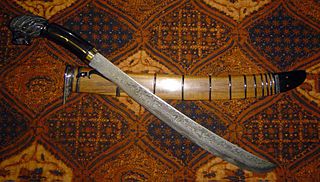
The kris or keris is an Javanese asymmetrical dagger with distinctive blade-patterning achieved through alternating laminations of iron and nickelous iron (pamor). The kris is famous for its distinctive wavy blade, although many have straight blades as well, and is one of the weapons commonly used in then pencak silat martial art native to Indonesia. Kris have been produced in many regions of Indonesia for centuries, but nowhere—although the island of Bali comes close—is the kris so embedded in a mutually-connected whole of ritual prescriptions and acts, ceremonies, mythical backgrounds and epic poetry as in Central Java. Within Indonesia the kris is commonly associated with Javanese culture, although other ethnicities are familiar with the weapon as part of their culture, such as the Balinese, Sundanese, Malay, Madurese, Banjar, Buginese, and Makassar people. Abroad, the kris is considered as a cultural symbol of Indonesia.

The culture of Indonesia has been shaped by long interaction between original indigenous customs and multiple foreign influences. Indonesia is centrally-located along ancient trading routes between the Far East, South Asia and the Middle East, resulting in many cultural practices being strongly influenced by a multitude of religions, including Buddhism, Christianity, Confucianism, Hinduism, and Islam, all strong in the major trading cities. The result is a complex cultural mixture, often different from the original indigenous cultures.
Jayabhaya or Jayabaya was the Javanese king of the Kediri Kingdom in East Java, Indonesia which ruled around 1135-1159 CE. With the title of abhiseka used is Sri Maharaja Sang Mapanji Jayabhaya Sri Warmeswara Madhusudana Awataranindita Suhtrisingha Parakrama Uttunggadewa. The reign of King Jayabhaya is considered the heyday of the Kediri Kingdom.

Prince Diponegoro, also known as Dipanegara, was a Javanese prince who opposed the Dutch colonial rule. The eldest son of the Yogyakarta Sultan Hamengkubuwono III, he played an important role in the Java War between 1825 and 1830. After his defeat and capture, he was exiled to Makassar, where he died, at 69 years old.

A golok is a cutting tool, similar to a machete, that comes in many variations and is found throughout the Malay archipelago. It is used as an agricultural tool as well as a weapon. The word golok is used in Indonesia and Malaysia and in the Philippines. Both in Malaysia and in Indonesia, the term is usually interchangeable with the longer and broader parang. In the Sundanese region of West Java it is known as bedog.

Pencak silat is an umbrella term for a class of related Indonesian martial arts. In neighbouring countries, the term usually refers to professional competitive silat. It is a full-body fighting form incorporating strikes, grappling, and throwing in addition to weaponry. Every part of the body is used and subject to attack. Pencak silat was practiced not only for physical defense but also for psychological ends. There are hundreds of different pencak silat styles and schools which tend to focus either on strikes, joint manipulation, weaponry, or some combination thereof.

Betawi people, or Batavians, are an Austronesian ethnic group native to the city of Jakarta and its immediate outskirts, as such often described as the native inhabitants of the city. They are the descendants of the people who inhabited Batavia from the 17th century onwards.

Sarekat Islam or Syarikat Islam was an Indonesian socio-political organization founded at the beginning of the 20th century during the Dutch colonial era. Initially, SI served as a cooperative of Muslim Javanese batik traders to compete with the Chinese-Indonesian big traders. From there, SI rapidly evolved into a nationalist political organization that demanded self-governance against the Dutch colonial regime and gained wide popular support. SI was especially active during the 1910s and the early 1920s. By 1916, it claimed 80 branches with a total membership of around 350,000.

Nyi Roro Kidul is a supernatural being in Indonesian folklore. She is the Queen of the Southern Sea in Sundanese and Javanese mythology.

Kemayoran is a district of Central Jakarta, Jakarta in Indonesia. It was best known for the former Kemayoran Airport and it has been transforming as a new central business district. As of 2023, it consists of numerous four and five star hotels, restaurants, premium office towers, hospitals as well as shopping and entertainment centers. Kemayoran is also home to the Jakarta Fair, the largest and longest fair in Southeast Asia that attracts more than 4 million visitors annually.

Sports in Indonesia are popular from both the participation and spectating aspect. Some popular sports in Indonesia are football, futsal, basketball, volleyball, badminton, and the native Indonesian martial art pencak silat. Badminton is arguably Indonesia's most successful sport. Indonesia has won gold medals in badminton in every Olympic Games since the sport was first introduced to the Olympics in 1992, with the exception of the 2012 Summer Olympics. Indonesia became the first grand winner in Badminton Olympics back then 1992. Indonesia regularly participates in the Thomas Cup, Uber Cup, and Sudirman Cup badminton championships, then became the first nation in history to complete those three titles. Indonesia also regularly participates in regional multi-events sport, such as the Southeast Asian Games, Asian Games, and Olympic Games. Indonesia is one of the major sport powerhouses in the Southeast Asian region, winning the Southeast Asian Games 10 times since 1977.

Oemar Said Tjokroaminoto, better known in Indonesia as H.O.S. Tjokroaminoto, was an Indonesian nationalist. He became one of the leaders of the Islamic Trade Union, founded by Samanhudi, which became Sarekat Islam, which they both cofounded.

Dead Time: Kala is a 2007 Indonesian neo-noir thriller film written and directed by Joko Anwar. The film stars an ensemble cast led by Fachri Albar, Ario Bayu, Shanty, and Fahrani.

Silat is the collective term for a class of indigenous martial arts from the Nusantara and surrounding geocultural areas of Southeast Asia. It is traditionally practised in Brunei, Indonesia, Malaysia, Singapore, Southern Thailand, Southern Philippines and Southern Vietnam. There are hundreds of different styles (aliran) and schools (perguruan) which tend to focus either on strikes, joint manipulation, weaponry, or some combination thereof.

The Legion of the Just Ruler or the Legion of Ratu Adil was a pro-Dutch militia and private army established in the aftermath of the Indonesian National Revolution. It was founded by the former KNIL Captain Raymond Westerling following his demobilisation on 15 January 1949. The militia's name was derived from a passage from the medieval Book of Prophecies of Joyo Boyo which prophesied the coming of a Just Ruler who would be of Turkish descent and come to save the people of Java and establish universal peace and justice. With his mixed Turkish heritage in mind, Westerling used the myth of the Just Ruler to create a following.
Satrio Piningit or also called Ratu Adil is a Javanese apocalyptic main character of Jongko Joyobhoyo in Javanese myths by which considered as one who would become a Great Leader of Nusantara and ruling the world from Java. In other traditions around the world, Satrio Piningit has a similar other apocalyptic characters as Messiah, Maitreya (Buddhism), or related to Imam Mahdi prophecy in Islam.

Indonesian martial arts includes a variety of fighting systems native to or developed in the archipelago of Indonesia, both the age-old traditional arts, and the more recently developed hybrid combatives. In the Indonesian language the term bela-diri is used to mean martial art, and in essence the Indonesian fighting arts are meant as one's defence against perceived threat and assault. Other than physical training, they often include spiritual aspects to cultivate inner strength, inner peace and higher psychological ends.

It is quite difficult to define Indonesian art, since the country is immensely diverse. The sprawling archipelago nation consists of 17.000 islands. Around 922 of those permanently inhabited, by over 1,300 ethnic groups, which speak more than 700 living languages.
Hanifan Yudani Kusumah is an Indonesian pencak silat practitioner. He won a gold medal in the 2018 Asian Games, after previously winning a bronze medal in the 2017 SEA Games.

Tjokropranolo was an Indonesian politician and former military officer who was the 8th Governor of Jakarta, serving between 1977 and 1982. During the Indonesian National Revolution, he was the assistant to Sudirman, and later wrote a biography of the commander.
















